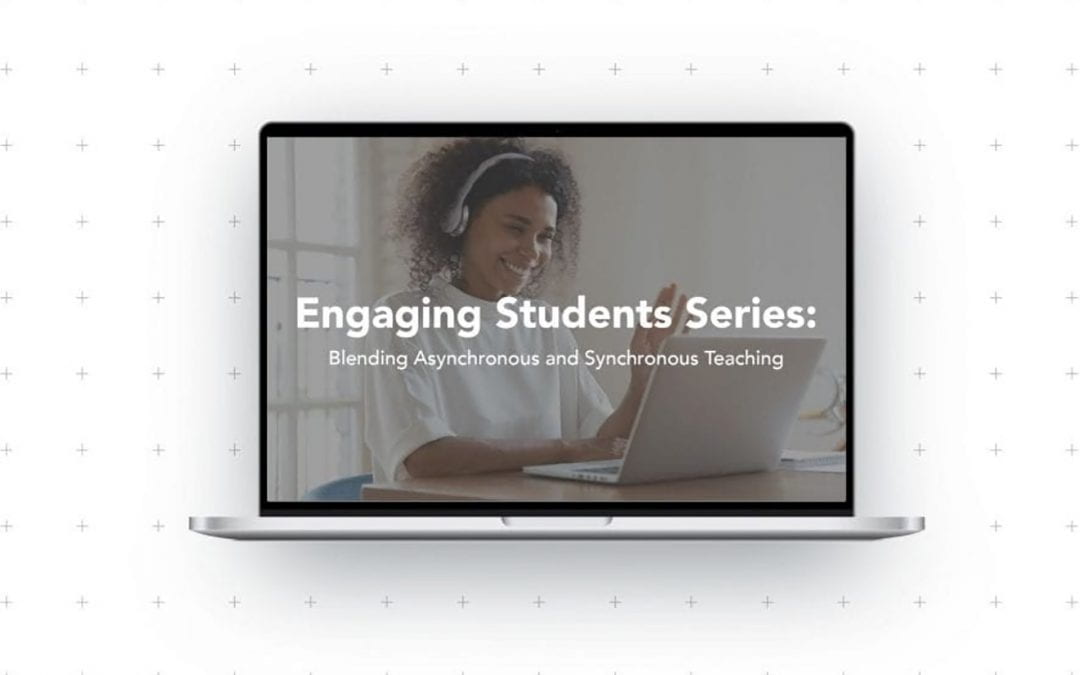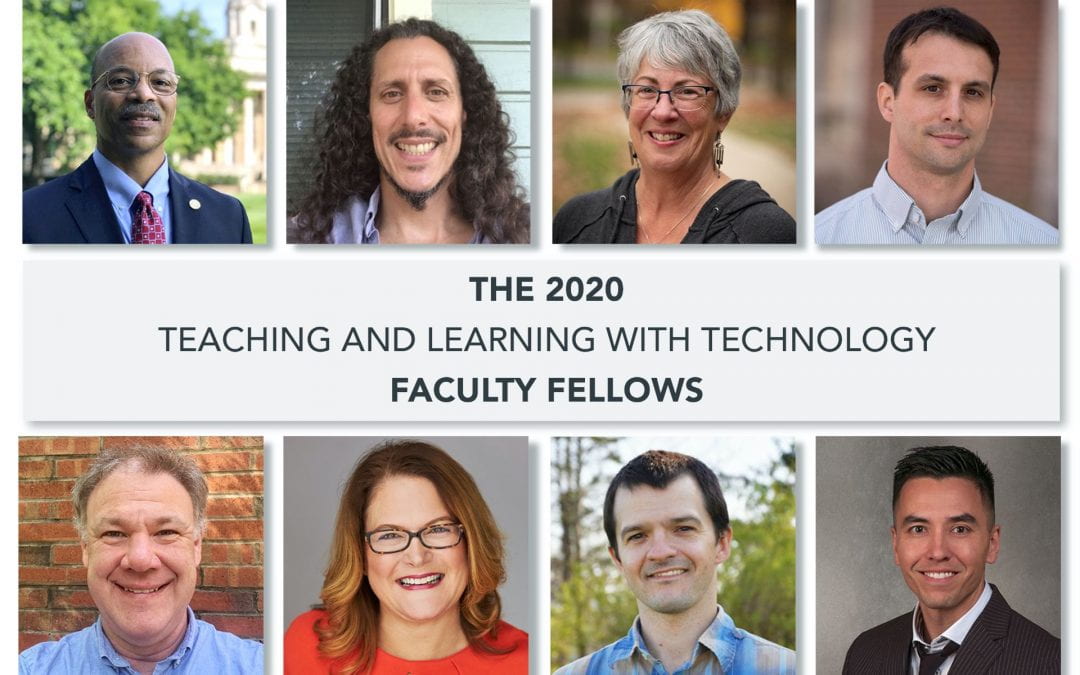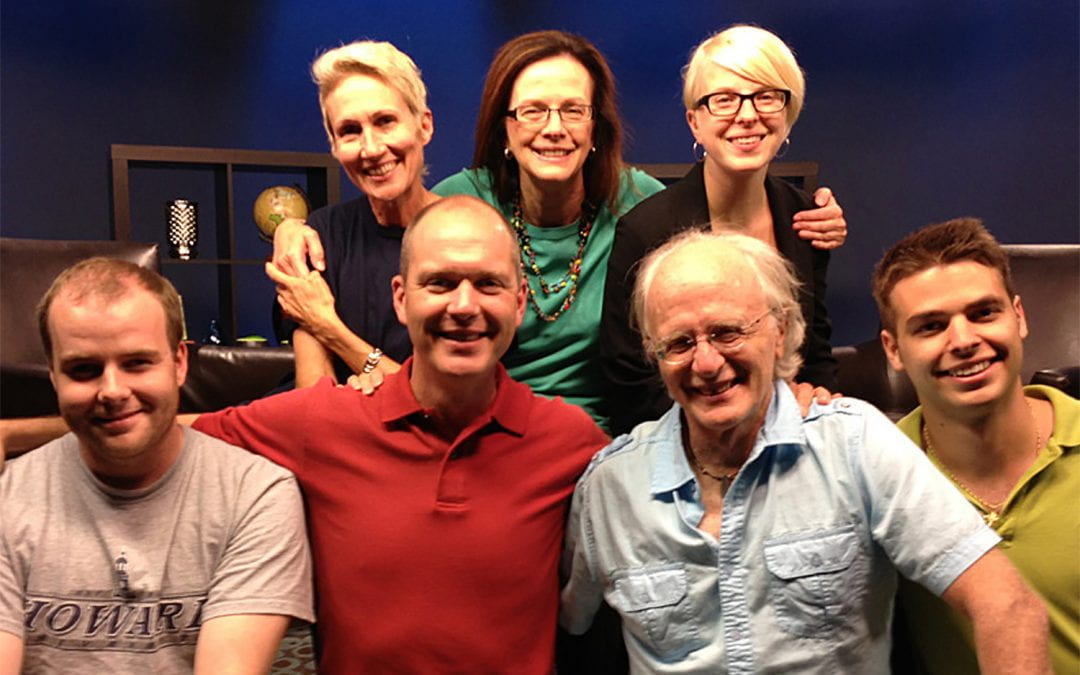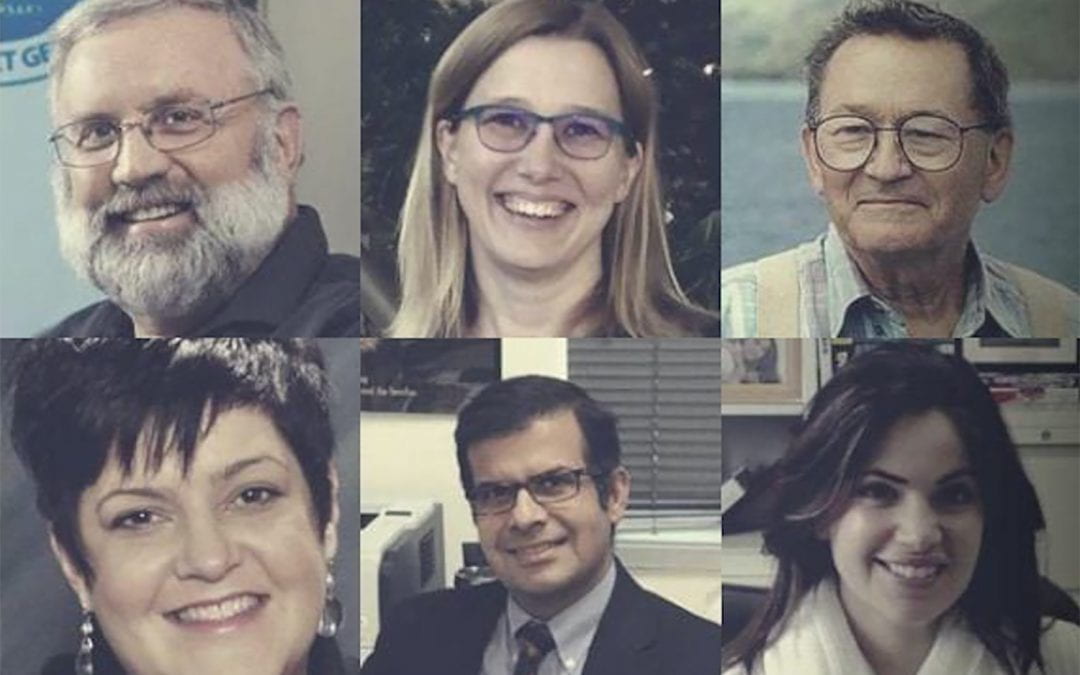
Jun 14, 2021 | Home Page
Born out of the Penn State Teaching and Learning with Technology (TLT) BlendLT program, the Engaging Students Series has been an instrumental resource for faculty to drive student engagement in the online space.
BlendLT offers a series of faculty engagement opportunities and resources that support converting traditional residential courses to a blended (face-to-face and online) format. Since its inception during the 2015-16 academic year, the program has assisted faculty-designed blended courses.
“We took the basis of the BlendLT program and adapted it to create the Engaging Students Series to help faculty figure out how to engage their students in this new online environment — especially for faculty who had never taught in an online format before,” said Erica Fleming, an instructional designer for TLT.
The Engaging Students Series was launched early during the pandemic to support Penn State instructors preparing to teach their summer 2020 courses online and was found to be such a popular and valuable resource that it has continued since. In addition, it has helped countless faculty who may or may not have already been familiar with teaching in an online environment. Past resources can be found in the Engaging Students Series Pressbook.
One such faculty member is Kelly Karpa, assistant dean of Interprofessional Education and a professor in the Department of Pharmacology at the Penn State College of Medicine. Karpa, who is responsible for engaging learners from 36 schools that have physical therapy, occupational therapy and pharmacy programs, never taught in an online format previous to the pandemic.
“Having the TLT folks walk through these different tools and options was hugely enlightening for those of us who had never taught online before and suddenly found ourselves thrust into that environment,” Karpa said. “Now, students are definitely more engaged than they would have been if it was just someone lecturing to them. There are now tools they can use to stay engaged in the course.”
Some of Karpa’s most significant takeaways from attending the Engaging Students Series sessions were learning various ways to incorporate Zoom and Canvas into courses. Before the remote transition, the College of Medicine had not used Canvas for pre-clinical courses. Other tools to drive student engagement in her courses included breakout rooms in Zoom, the chat feature in Canvas, and Google Docs for small-group collaboration.
Another faculty member new to teaching online (and participating in Zoom meetings) who sought out resources like the Engaging Students Series is Judith Newman, an associate professor of human development and family studies at Penn State Abington. “I began teaching in 1977, so I was around 70 when the pandemic pushed us into remote teaching,” Newman said. “I was very old school in regard to technology; I had a lot to learn.”
Some of the most valuable takeaways for Newman included making Zoom polls and the resources available on online exams and academic integrity. “Finding ways to engage students was certainly more difficult in a remote environment,” she said. “But I began to get more and more confident that there were things I could do that I had not done before.”
Despite the return to normal on the horizon, TLT plans to continue to offer more workshops in the Engaging Students Series, focusing on engaging students in online environments while also incorporating more strategies for engaging students online while teaching in-person classes. TLT will be announcing dates in July for future sessions.
Fleming said, “Engaging students in online spaces does not stop when we go back to in-person classes. Faculty can take the lessons they’ve learned from the remote teaching and learning period and incorporate those to create more engaging, successful, and inclusive spaces for their students when we’re back to in-person teaching and learning.”

Sep 23, 2020 | Home Page
Penn State’s Teaching and Learning with Technology (TLT) has welcomed eight instructors as members of the newest Faculty Fellows cohort. During the 2020-21 academic year, the projects of Justin Brown, along with colleagues Adrian Barragan and Jamie Garcia Prudencio, Margaret Hoffman, Tom Hogan, Randy McEntaffer, Dawn Pfeifer Reitz, and Jan Reimann will, in their unique ways, focus on student engagement.
“The current state of higher education has placed a bright spotlight on the need to keep students involved with and participating in their coursework,” said Bart Pursel, director of innovation with TLT. “We’re thrilled to welcome this year’s TLT Faculty Fellows whose projects are dedicated to student engagement and how technology can help take it to new heights.”
Throughout the 2020-21 academic year, the fellows will work with a dedicated team of TLT staff to realize the goals set forth by their projects. They cover an array of topics that are strongly influenced by each fellow’s discipline and background.
Adrian Barragan, Justin Brown, and Jamie Garcia Prudencio – Immersive Experience Learning (IMEL) Technology Application to Veterinary and Animal Sciences Educational Materials
Barragan, an assistant clinical professor in the Department of Veterinary and Biomedical Sciences; Brown, an assistant teaching professor in the Department of Veterinary and Biomedical Sciences; and Prudencio, an assistant teaching professor for Spanish in agriculture in the College of Agricultural Sciences, intend to use their project to engage students through immersive technology.
The three instructors have outlined a series of 360-degree videos that aim to give students in Comparative Vertebrate Anatomy (VBSC 421) access to course content they would not otherwise receive.
“The lab component of VBSC 421 trains students to identify anatomic structures and how they relate to function,” said Brown. “They’re exposed to a wide diversity of animal taxa at various stages of the lab; however, most of the dissections focus on the lamprey, shark, and domestic cat. Immersive technology can help provide a more engaging level of exposure to large animal anatomy like horses, pigs, cows, and deer.”
Along with their course-specific immersive content, Barragan, Brown, Prudencio, and the rest of their team will develop a step-by-step protocol for including 360-degree video in coursework. The instruction document, including photos and short videos, will be available to faculty across Penn State upon request. They will also survey students to assess their perceptions of, and satisfaction with, the immersive content.
Margaret Hoffman – PILLAR Project: Place-based Immersive Learning for Landscapes
Hoffman, an assistant professor of landscape contracting in the Department of Plant Sciences within the College of Agriculture, will use her project to work towards increasing students’ sense of investment in their education through immersive technology. Through collaborative learning between institutions, place-based learning, and immersive technology, her project aims to create virtual field trip experiences for Penn State landscape design students.
“Current health concerns and limited resources make study abroad and study away programs challenging, if not impossible,” said Hoffman. “Studies of immersive technology and virtual field trips have uncovered some advantages. So, it’s important to continue working to understand how these tools can help provide out-of-the-classroom experiences essential to student growth and development.”
Hoffman and her team will look to create engaging work for students by having them film significant regional landscape design installations, create an immersive tour, and conduct a lesson focusing on the site’s design principles and elements. Another goal of the project is the creation of a Faculty Learning Community to share lessons and best practices of engaged, place-based learning across disciplines.
Tom Hogan – The Virtual Transformational Leadership Development (VTLD) Experience
Hogan, a professor of practice, human resource management in the College of Liberal Arts’ School of Labor and Employment Relations, wants to use student engagement to help accelerate undergraduates’ development of global leadership skills. His project team plans to utilize virtual experiential learning practices and reflective exercises to help develop shared skills by influential, impactful leaders.
“Transformational leaders possess the ability to unlock the talents, gifts, potential, and so much more from the people who follow them,” said Hogan. “By using the arts as an agent of change, delivering content virtually, incorporating interactive reflection exercises, and employing the help of a leadership development coach, the VTLD Experience can deliver a customized transformational experience to undergraduate students.”
The vision for Hogan’s project, as it grows, includes a machine learning and artificial intelligence component. These technologies can be utilized to personalize and improve the VTLD Experience as more data becomes available. Additionally, cloud-based storage will be used so that the project’s work can be scaled across Penn State and domestic and international higher learning institutes.
Randy McEntaffer – Exploring the Universe through Virtual Reality
McEntaffer, professor in the Departments of Astronomy and Astrophysics, Physics, and Materials Science and Engineering, and his team will embark on a project with the potential to impact thousands of Penn State undergraduate students who take introductory astronomy courses each year. Their goal is to overcome the physical limitations of engaging with astronomy course materials by utilizing a virtual reality (VR) application called “Titans of Space.”
“We want this project to provide students with physically engaging content that conveys complex astronomical concepts through self-led demonstration,” said McEntaffer. “By augmenting traditional lecture-based content with virtual reality-based lessons, we believe we can then assess student interest and engagement as well as their understanding of the material.”
McEntaffer’s team will divide its work over this academic year into three phases, initially working with a small group of students and assessing their individual experiences with VR-based astronomy coursework. In spring 2021, the final stage will use assessment results from the first two for the creation of VR content that will be incorporated into an ASTRO 001 lecture on the solar system. The students’ answers to the questions regarding their experience with VR-enabled learning could provide valuable insight toward gauging the difference between traditional learning and learning with immersive technology.
Dawn Pfeifer Reitz – Elevating Your Game: There’s an App/Module/Tool for That
Pfeifer Reitz, assistant teaching professor and CAS 100 coordinator at Penn State Berks, recognizes a gap between “soft skills” that employers value, like oral and written communication and adaptability, and how they fit into the rigid academic constraints of STEM programs. Her fellows project will work towards creating a digital “tool kit” that will engage students with specific work designed to improve their soft skills.
“This project is a wonderful opportunity to bridge the educational gap between what students are taught in their STEM curricula and other skills they need to succeed in professional life,” said Pfeifer-Reitz. “Along with potential career impact, these ‘soft skills’ that our project will promote can help improve student sociability, increase campus engagement, and improve in-class group work.”
Pfeifer Reitz and her team are setting out with the goal of marrying the technology aspect of teaching and learning – using an app, module, or tool to use “soft skills” to help create an elevator pitch – with the personal engagement aspect of connecting with students. They are also taking into account that different levels of students would perform various types of work to improve their “soft skills.” So, they are intentionally molding their project to deliver an end product that is flexible and scalable across the University.
Jan Reimann – Learning Math with Jupyter Notebooks
Reimann, associate professor of mathematics in the Eberly College of Science, and his team aim to take advantage of Jupyter Notebooks’ open-source platform and their built-in interactivity to create affordable, engaging course content for undergraduate math students at Penn State.
“Instead of relying on static data in a traditional calculus textbook, a Jupyter-based course can pull data in real-time from various sources like financial markets or sports statistic databases,” said Reimann. “This gives instructors, and students access to much more current and relevant content, which can help improve engagement. For example, in March 2020, I demonstrated a Jupyter Notebook to my Math 110 course and explained the basic features of logistic functions by modeling the latest COVID-19 data.”
Reimann and his team will work toward creating a content library and collecting data sources that will allow for the creation of interactive notebooks within Penn State’s math department long after the fellowship project has concluded. Additionally, they recognize their project’s potential to increase the overall accessibility to Project Jupyter at Penn State and help organize the University’s existing Jupyter community.
To learn more about the TLT Faculty Fellows program, please email fellows@psu.edu.

Aug 7, 2020 | Home Page
Teaching and Learning with Technology (TLT) will host a panel discussion to share ideas for creating engaging educational video content on August 24 at 1:00 p.m.
Use this form to register to attend the panel discussion.
The panel will be filled by the creators of the Creativity, Innovation, and Change (CIC) massive open online course (MOOC) that launched in 2013 on the Coursera platform. Jack Matson, Kathryn Jablokow, Darrell Velegol, and Susan Russell will share their stories about how theater principles played a critical role in producing captivating video content as part of the CIC course experience.
“In working with various members of the CIC team over the years, they have a compelling story that started with their original plans of video production and slowly evolved,” said Bart Pursel, interim director of innovation with TLT. “When Susan Russell joined the team, she introduced elements of theater to help the instructors deliver videos that were both educational and engaging.”
“With all of the challenges surrounding course delivery this fall, I think faculty that are interested in exploring educational video as a strategy to engage students will find this panel very insightful,” Pursel added.
CIC was one of the first five MOOCs created by Penn State faculty in 2013. CIC 1.0 and 2.0 engaged over 200,000 students, and the team is now wrapping up version 3.0 with additional co-instructors and activities.

Mar 20, 2020 | Home Page
Teaching and Learning with Technology (TLT) has worked alongside 42 diverse faculty fellows since 2009 at the intersection of pedagogy and technology. A new group of fellows is forming and TLT is seeking proposals from the University community.
For the 2020-21 academic year, TLT Faculty Fellows projects will center around the theme of student engagement. Penn State is home to a wide array of student engagement initiatives and identifies these efforts as ways to transform education in and out of the classroom. TLT aims to work with this year’s fellows to better understand how educational technology can increase student engagement.
University faculty from any college, discipline, or campus are invited to submit their ideas on how they believe technology can advance engaged learning at Penn State.
The window to apply for this year’s TLT Faculty Fellows cohort is open now and proposals are being accepted until Friday, April 24. Faculty who submit successful proposals will work collaboratively with TLT staff to combine ideas, innovative spirit, and academic expertise to apply emerging technologies to teaching and learning.
To request more information or to submit a proposal, please email tltfellows@psu.edu.



